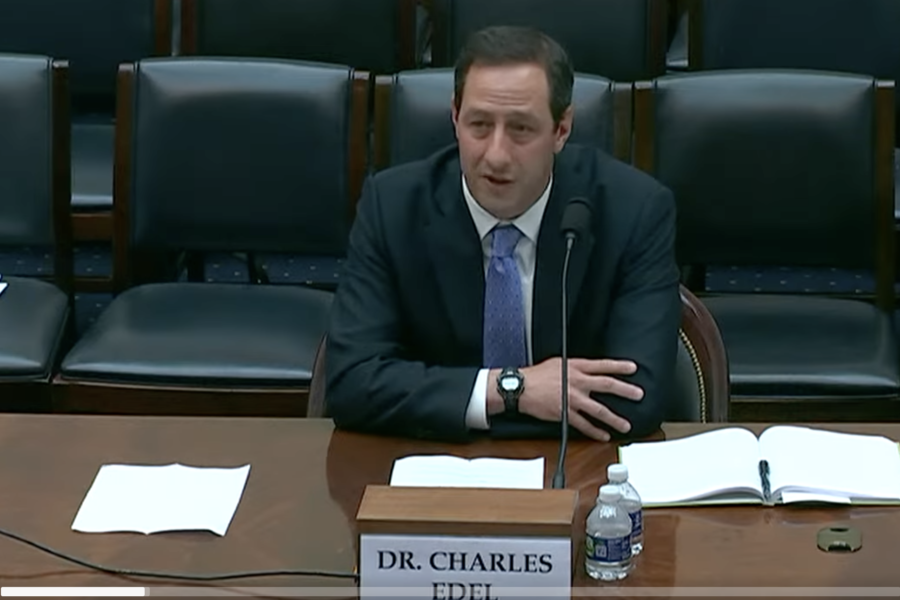Lawmakers studying the lessons learned from the Ukraine war believe that speeding delivery of F-16s and Stingers among other kit to Taiwan, and forming a clear defensive coalition in the Pacific, could deter China from a mid-decade invasion.
“Taiwan is seeing delays right now in stingers, harpoon coastal missile defense systems, and F-16 [upgrades],” Rep. Andy Barr (R-Ky.) said May 19 at a hearing of the House Foreign Affairs subcommittee on Asia, the Pacific, Central Asia, and nonproliferation, held the day President Joe Biden began a trip to South Korea and Japan.
Barr quoted the Taiwanese Minister of Defense, who said that China will be capable of mounting a full-scale invasion of Taiwan by 2025 and Taiwan may not get American-made and paid-for weapons in time.
“The current timetable for deliveries to Taiwan are falling behind,” Barr said, noting that 66 F-16 fighter jets are not expected for delivery until 2026, 108 Abrams tanks in 2027, and 40 Paladin self-propelled Howitzers in 2027.
“I hope we’ve learned our lesson from Ukraine that pre-invasion arms, military assistance, is a deterrent. And failure to provide that beforehand is an invitation for aggression,” Barr added. “This is unacceptable if we are to deter the [Chinese Communist Party’s] growing aggression.”
But the Ukraine war is already taxing the U.S. industrial base. The United States has given more than a quarter of its stock of Stinger air defense weapons to Ukraine, and the industrial base does not have the capacity to quickly replace the weapon system. The Defense Department has said it intends to replace the weapon stocks “one-for-one,” but has acknowledged that could take years.
During the hearing, a panel of Indo-Pacific experts assessed the lessons China is likely taking from Russia’s invasion. In particular, they agreed that deterrence failed and warned that preventing China from invading Taiwan will require adequately arming Taiwan and a clear commitment of the United States and Pacific partners to come to Taiwan’s defense.
Chinese Assumptions
“The Chinese assumption is that what we did in Ukraine, they’re envisioning a light version of that for Taiwan,” said Bonny Lin, director of the China Power Project at the Center for Strategic and International Studies (CSIS) in Washington, D.C.
Lin also said China has not condemned Russia’s invasion of Ukraine, and Beijing is walking a fine line to continue doing business with Russia, including the sale of semiconductors, without systematically evading sanctions.
Charles Edel, CSIS Australia chair and senior adviser, said China also announced a major food purchase with Russia before the Feb. 24 invasion and signed a deal with Russia to buy more gas, demonstrating a willingness to give Russian President Vladimir Putin a lifeline and maintain their strategic alliance.
The American Enterprise Institute’s director of Asian studies Dan Blumenthal told members of the subcommittee it was important for the United States to build a political coalition with other nations and show China that many countries would defend Taiwan if it were invaded.
“We need private diplomacy that focuses on the fact that we are going to need first and foremost to build a political coalition, political unity, around the fact that we are going to push back against Chinese aggression. That work hasn’t even begun,” he said.
In part, Blumenthal explained that confusion arises with allies because the United States has both a One China policy, which acknowledges Taiwan as part of China with no official diplomatic relations of its own, and a Taiwan Relations Act, which allows for the U.S. to sell defensive weapons to Taiwan. The resulting policy, known as “strategic ambiguity,” means China does not know if the United States will come to Taiwan’s defense.
“We have to be working now just to go around the world and say, ‘Look, if China attacks Taiwan, here are the foundational principles of international law, international relations that it is violating.’ And we need to come up with that foundation, and we need to sell it,” Blumenthal said.
If not, he argued: “It’s going to affect our military operations, because political unity is going to be the number one ingredient to success in military operations.”
Strategic Impacts
Blumenthal explained that if China took Taiwan, Japan would no longer be defendable, and China’s strategic position in the Pacific with Taiwan under its control would be a threat to the United States.
“With an attack on Japan, you begin the unraveling of the alliance system in the Asia Pacific. The alliance system in the Asia Pacific is what has kept us safe since World War II,” he said. “A forward defense of Taiwan is essentially a forward defense of the American homeland.”
Subcommittee ranking member Rep. Steve Chabot (R-Ohio) concluded that it’s time the United States did away with the policy of strategic ambiguity, better arm Taiwan, and clearly state—along with coalition partners—that it would defend Taiwan if it were invaded by China.
“Military confrontation, the chance of that goes up, as China thinks that Taiwan is weak, and they could take them or they think the United States is not committed,” said Chabot.
“I think rather than strategic ambiguity, we ought to have strategic clarity,” he said. “Where they know we would be there; they know Taiwan is strong. So, they decide military action makes no sense. Then we have peace. We avoid war.”
